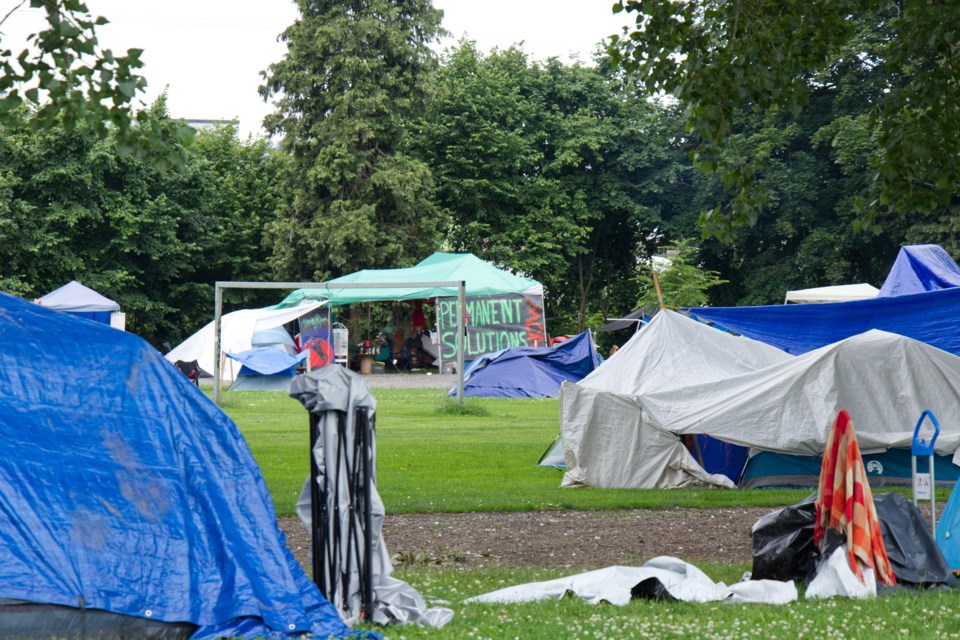B.C. finished the most expensive and ambitious push to end homelessness in the province’s history last week, throwing enormous sums of money at new shelter spaces and housing units designed to clear tent cities at Beacon Hill Park in Victoria and Strathcona Park in Vancouver.
It’s still not clear whether it will work.
Attorney General David Eby launched out of the gate with a blank cheque from Premier John Horgan after October’s election, and has spent big to try and create new spaces during a pandemic that has worsened the housing crisis.
In Vancouver, that’s meant more than $250 million worth of purchases for 14 buildings, former hotels and single room occupancy sites, equalling at least 767 beds, according to an analysis by CBC reporter Justin McElroy.
Add to that at least tens of millions more in Victoria, where the province has been buying hotels, leasing the Save-on-Foods Memorial arena, and converting empty commercial space into makeshift shelter pods, opening up 163 spaces.
The cost of the Capital City Centre hotel near the downtown core was $25 million alone.
Easily, the total taxpayer expenditures in both cities exceeds $300 million.
No government has ever thrown that kind of money in one year at the homelessness problem.
The goal was to close tent cities by April 30.
And yet, early indications are it may not do the job.
So far, tents remain in Beacon Hill Park (and other locations) during a grace period of several weeks in which the City of Victoria waits for final spots to open up at two renovated shelter sites.
Even afterwards, it’s not clear if the city has the fortitude to send in bylaw officers and police on 24/7 campers, as it promised in a memorandum of agreement with the B.C. government in exchange for all those provincial dollars.
Victoria Police have reported several cases of assaults and arrests at the park - including a man choking a missing 15-year-old in one of the tents, another man with a knife chasing a family through the park, and the arrest of a man with an “extensive criminal history” for assault and a variety of offences last month. The department has deemed it an “unacceptable” level of calls for one location.
The new spaces aren’t going to house those types of individuals - they are operated by groups like BC Housing and Our Place, which won’t tolerate criminal activity or violence. Inevitably, those still committing crimes, or those not ready for treatment, or those suffering mental health issues too deep and complex for the services offered to them, will end up back in tents at some sort of local park, despite millions of dollars worth of new spaces.
More visual progress has been made at Strathcona Park in Vancouver, where bulldozers have taken out most of an encampment that had been in place for almost a year.
But that site was actually just an extension of previous camps that had been closed at Oppenheimer Park and CRAB Park. Some of the unhoused residents told TV news crews they expect another tent city will pop up in a fourth location soon.
Eby has taken pains to say all the new spaces created come with wrap-around supports, which mean meals, showers, laundry and the ability to seek substance use and mental health help on site.
Still, those who navigate the journey of housing, addiction and mental health face a perilous path of waiting lists, ministry silos and underfunding.
The problem now is not the physical housing spaces, but the services available to keep a person healthy enough to remain inside.
There’s no denying the more than $300 million in funding for shelter spaces was a huge step forward. But if the province truly wants to keep tents out of local parks, it’s only one of many.
Rob Shaw has spent more than 13 years covering BC politics, now reporting for CHEK News and writing for The Orca. He is the co-author of the national best-selling book A Matter of Confidence, and a regular guest on CBC Radio.
SWIM ON:
- Rob Shaw last wrote that travel restrictions have fallen from an off-the-cuff promise of random police roadblocks, to an honour system turnstile – and that’s probably for the best.
- Last summer, Jody Vance wrote BC is faced with a more urgent crisis than COVID-19, but hasn’t seen anywhere near the same level of concerted, coordinated action. That has to change, right now.
- In September, Vancouver Councillor Sarah Kirby-Yung argued that Mayor Kennedy Stewart’s urgent homelessness motion had nothing to do with relief for the Strathcona encampment.



